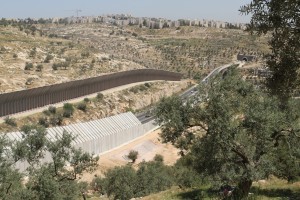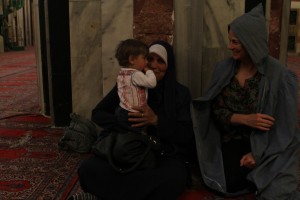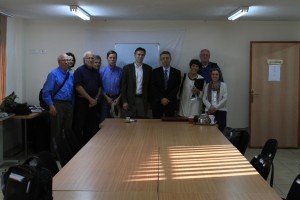Traveling in Bethlehem and Hebron, by Gerri Haynes
(Gerri Haynes, a former president of Washington Physicians for Social Responsibility, is once again sending back reports from inside blockaded Gaza. As she did four times before, Gerri has organized a team of doctors and other health care providers to work in hospitals and clinics in Gaza in an effort to directly help the people there and to bring attention to the ongoing humanitarian crisis that the Israeli blockade has created. Ninth in the series.)

Bypass roads cut up the Palestinian land, with more land lost to Israeli settlements like the one in the distance here (Photos by Bob Haynes).
This morning, we toured the edge of Bethlehem and realized some of the scope of the Wall separating Israel from the West Bank. Zoughbi told us that Israel controls 87% of the Bethlehem area and there are 23 Jewish settlements on the occupied land around Bethlehem. In one area, the Wall is being installed that will take away thousands of acres of fertile agricultural land from Bethlehem. Bypass roads cut through the land, most of them forbidden to Palestinian traffic. The situation is dispiriting. Still, the people we meet here are hopeful for peace to come to this crucible of the world.
We traveled to Hebron and visited the Old City. Near the tomb of Abraham, 400 Jewish settlers
live in a compound guarded by 2000 Israeli soldiers. The Ibrahim Mosque/Synagogue has been divided since Baruch Goldstein massacred 29 Muslims at prayer during Ramadan in 1994 and much of the Old City is forbidden to Palestinians.This afternoon, we were delighted to visit with Mustafa Barghouti, M.D., head of the Palestinian National Initiative and founder of the Palestinian Medical Relief Committee. We talked about the possibility of combining some of the work we are doing in Gaza with work that might be done in the West Bank. Dr. Barghouti’s continual efforts to reconcile differences between political parties in Palestine provide hope for many Palestinians.
His work in the BDS* and non-violent resistance campaigns are markers for Palestinians who seek non-violent methods of seeking peace and justice.*Editor’s Note: In 2005, Palestinian civil society issued a call for a campaign of boycotts, divestment and sanctions (BDS) against Israel until it complies with international law and Palestinian rights.
RSS feed for comments on this post. TrackBack URI

